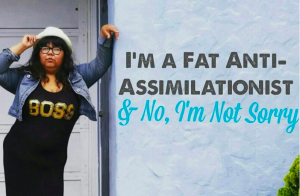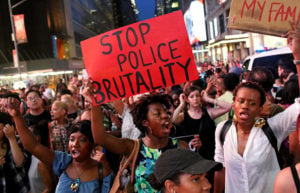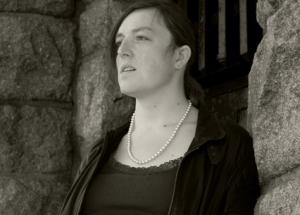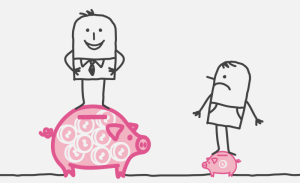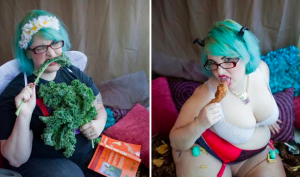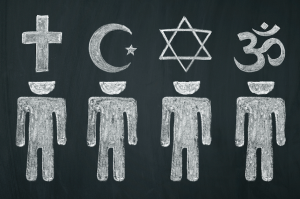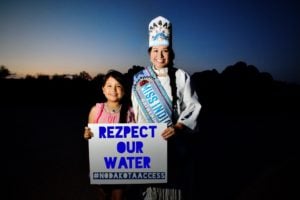
Two people laughing with child at a park.
Sometimes becoming a parent feels out of my reach. My wife and I both have uteruses, and sperm costs too damn much.
Even adopting feels like an unattainable dream. It can cost upwards of $40,000 to adopt, and LGBTQ couples have previously been barred from adopting and fostering because of their gender and/or sexuality.
Raising kids on working-class salaries here in Seattle, one of the world’s most expensive cities, isn’t exactly ideal. And despite its progressive reputation, this white haven often feels hostile to me as a Black queer non-binary person partnered with a Black queer femme immigrant.
I have enough heart to be a parent, but I have to ask myself: Do I have the will to raise a Black child when our people are being killed every day? In the last week of December 2017 alone, four Black queer women were murdered, and I can’t help but picture me and my wife in their shoes.
Furthermore, what do you tell a child of queer parents when lawmakers believe that businesses should be allowed to use religion as an excuse for banning LGBTQ people? Policies are constantly being put on the table that strip families like mine of their humanity.
Despite my fears, I remain open to parenting because of my friendships with trans, non-binary, and queer activists of color whose parenting is bound up in their quest for liberation. Their existence dares me to dream of parenting one day.
These parents are turning this tumultuous political moment into teachable one by talking to their kids about oppression: What it is, how it manifests and how to interrupt it. Their parenting is rooted in intersectional feminist and anti-racist values.
This type of parenting is essential during a time where our president casually calls Africa a “shithole.” President Donald Trump’s blatant racism and misogyny might poison our youth and their futures if they don’t learn about systemic oppression and how to dismantle it.
Selena Velasco, a Chamoru queer non-binary femme artist and community organizer in Seattle, explains Trump and his discriminatory policies to their 8-year-old multiracial son Elijah by bringing the issues close to home.
To help Elijah understand Trump’s recent immigration ban, Velasco asked him to imagine how he’d feel if his grandparents who immigrated from Mexico had to leave the US and couldn’t come back. This allowed him to better empathize with those directly impacted by the ban.
Also, Velasco has brought their son to Black Lives Matter marches and spoken with him about how anti-Black racism shows up at his own school. Their hope is for Elijah to be able to spot and disrupt anti-Blackness on the playground and beyond.
Velasco draws parenting inspiration from their mother, who was never afraid to speak out against racism. They remember their mother once reprimanding store workers for ignoring them in favor of white children. Seeing that was empowering and instructive for Velasco.
“I want my child to feel that same energy, like they have enough strength and power to be able to stand up against oppression,” Velasco says.
I, too, remember my mother pushing back against racism. She called out a white lady employee for treating her as if she’d stolen a pair of pants. It took guts for her to advocate for herself in our small Confederate flag-laden town.
I’m grateful to have seen my mother reject racism. If I have kids, I hope to set a similar example for them. No matter how hateful the political climate, I want them to see value in
Black and Brown skin and queer and trans lives because it’s who they are and who I am.
My heart is full of gratitude for trans, queer, and non-binary people of color who are raising children to love and respect people of all races, genders, and sexualities. I look forward to these kids being old enough to lead this country out of the grips of bigotry and oppression.
Parents or not, I believe we can all learn something from the intentional, thoughtful practices of revolutionary LGBTQ parents of color. Here are 4 ways that trans, non-binary, and queer parents of color are raising revolutionary children during the Trump era:
1. They don’t hide the hard stuff from their kids—they keep it real.
Shaun is a Black queer non-binary parent and researcher in Seattle who keeps it real with their child about this turbulent political era. While their 4-year-old daughter V doesn’t know Trump’s name, she knows what he’s doing isn’t right due to her parents’ longtime activism.
Shaun’s daughter, who’s mixed with Black and white, already knows that police are harmful. She learned this after three of Shaun’s friends got pepper sprayed at a protest against the Seattle Police Department’s shooting of Charleena Lyles, a 30-year-old pregnant Black mother.
After seeing their friends in pain shortly after the pepper spray incident, V was confused about why the police hurt them. Shaun told her the truth: Because they didn’t have enough training to keep people safe.
And when their daughter asked if the police could hurt them, Shaun told her the truth yet again, “Me and mommy are going to do our best to make sure that we always keep you safe.” Shaun couldn’t tell her “no” because of the realities of our anti-Black police state.
Velasco also keeps it real while parenting, using books to teach Elijah about our country’s long legacy of white supremacy and how history repeats itself. This is their effort to decolonize the education their son is receiving at school.
2. They teach their kids that their bodies belong to them.
Organizing alongside queer and trans people of color (QTPOC) who normalized asking for consent to hug and touch each other shifted Velasco’s parenting in a major way. It led them to teach their son about consent and bodily autonomy at a young age.
When Elijah was as young as three or four, Velasco made it clear to him that he owned his own body. They encouraged him to take space from his parents whenever he needed it.
Because Velasco grew up in a family plagued by abusive dynamics, reclaiming autonomy over their own body and teaching their son about bodily autonomy has proved to be a transformative act. For them, it’s a part of an intergenerational healing process:
“How do I heal, and how do I create space for my child to heal? And then also, how can they go into the world and address so many things that are hurting our Black, Brown, and Indigenous communities, and how do we create healing wherever we go?”
3. They expose their kids to diversities in race, gender, and sexuality.
Both Shaun and Velasco affirm their children’s race by sharing ancestral stories and practices with them. They want their kids to be proud of their cultures and where they come from.
They also want them to understand that gender exists outside of the binary. Their kids know to ask others for gender pronouns and that a person’s pronouns may change because gender is a fluid thing. They’re growing up aware of their right to determine their own gender.
It’s not easy for QTPOC parents to find gender-diverse children’s media. Most of it suggests that only boys can do “boy things,” and only girls can do “girl things.” Binary portrayals of gender push Shaun and their wife to get creative when reading books to V.
“When we’re about to start a story, we’ll ask what the characters’ names are going to be this time, what their pronouns are going to be this time, we’ll change up relationships. We’ll just try to queer things up as much as we can,” Shaun says.
Velasco actively creates space and dialogue with their son about things like race, sex, and bodies, and he asks questions about these topics with no shame. This is a big deal for Velasco, who wasn’t able to have these types of conversations with their parents growing up.
4. They create a community around their children.
Shaun strives to build a community around their kid that allows her to see “the rich diversity of the human experience.” They’re collaborating with like-minded parents to create an intentional cohousing community for their families.
Velasco also finds it important to surround their child with a community, specifically QTPOC. This helps Elijah learn about the shared struggles of trans, non-binary, and queer communities of color. He gets to witness these communities working together in solidarity towards liberation.
“I really want to have Elijah present in a lot of these spaces because I think it’s important for him to see me in my own power and to feel that he also has autonomy to be present in movement work,” Velasco says.
Elijah recently asked their parent what “resistance” means because he hears the term in movement spaces. As he grows up around activists, he’s sure to learn more about what resistance is and what it looks like. It’s a good thing there’s a village to raise this revolutionary child.
***
Maybe, one day, social justice and anti-oppression will be required coursework in all schools. Until then, parents like Shaun and Velasco will continue bringing the revolution home by relying on their ancestries, creativity, and values to raise conscious kids in the face of white supremacy.
[do_widget id=’text-101′]
Neesha Powell-Twagirumukiza (she & they pronouns) is an Everyday Feminism Reporting Fellow. Neesha identifies as an intersectional feminist, womanist, writer, community organizer, facilitator, dancer, freedom fighter, wife, and cat mama. She’s constantly conspiring in the name of liberated Black futures, queer and trans people of color power, solidarity economics, and transformative justice/community accountability. Neesha’s based in a suburb south of Seattle, where she lives, loves, and creates with chosen family.
Search our 3000+ articles!
Read our articles about:
Our online racial justice training
Used by hundreds of universities, non-profits, and businesses.
Click to learn more








